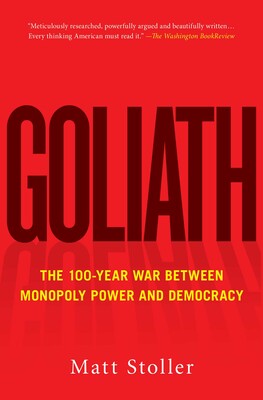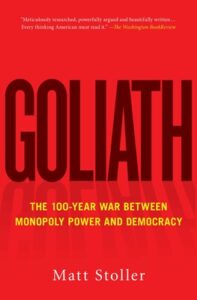

“If someone disagrees with me, he must have bad or venal motives.”
The quote above could be the subtitle of Matt Stoller’s 2019 book, Goliath: The 100-Year War Between Monopoly Power and Democracy. I’ve been working on my next article for the Hoover Institution’s Defining Ideas site and when I mentioned it to a friend that it’s on antitrust, he recommended that I read Stoller’s book. I read parts and paged through the rest.
What struck me is that Stoller has a tendency to attribute disagreements with him to bad motives on the part of those who disagree. Related to that, he has a tendency to not actually examine their arguments carefully but, instead, to dismiss them. He also seems to think that when people want to keep certain decisions out of the hands of government, they are attacking democracy.
I called him out on some of this a few years ago when Stoller wrote a nasty attack on Aaron Director. The site that published him, misleadingly labeled Pro-Market, did have the decency to repost my blog post on its site, along with his response. So I won’t rehash that: take a look, if you’re interested.
Instead I’ll hit two highlights from Goliath.
On James Buchanan and Gordon Tullock:
Behind the rhetoric of science was an attack on democracy. Considerations of equity, democracy, and social stability became, as Bork put it, “vague, squishy, and dangerous,” a “reckless and primitive egalitarianism.” In 1947, at Mont Pelerin, James Buchanan founder of public choice theory and one of the Chicago School’s later Nobel Prize winners, referred to the need to ensure that wealthier citizens must not be forced to shoulder a disproportionate tax burden. Freedom, particularly economic, required “the removal of certain decisions from majority-vote determination.” He and Gordon Tullock used a scientific veneer in The Calculus of Consent to argue a one-person, one-vote system was inefficient.
Where to start? Let’s leave out the fact that at age 27, Jim Buchanan was not invited to the 1947 Mont Pelerin meeting. And let’s also leave out the fact that Buchanan, to his death as far as I know, advocated a 100 percent marginal tax rate on all estates above a fairly moderate value. (I don’t defend this; I simply point it out.) I bet he advocated heavier death duties than Stoller does.
It’s certainly true that Buchanan wanted governments not to use the tax system to discriminate against wealthy people who were alive. Is that an attack on democracy? I don’t know Stoller’s views on the legality of abortion, but the Supreme Court’s Roe v. Wade decision of 1973 was certainly “the removal of certain decisions from majority-vote determination.” Would Stoller cast similar aspersions on the seven judges who voted for the decision in Roe v. Wade?
Also, while it has been many decades since I worked though The Calculus of Consent, I certainly didn’t notice a “scientific veneer.” It is scientific, but it’s deep-down scientific.
On Robert Bork:
A seminar at the University of Rochester for executives offered Bork a lucrative speaking opportunity on mergers.
Notice the undercutting word “lucrative,” as if the money might have motivated Robert Bork to say things he didn’t believe. I bet that a transcript of the talk, if there was one, would have shown that Bork said the same things he had earlier said when he wasn’t paid much. I’ve had about five or six lucrative speaking opportunities in my life, if you define lucrative to mean “paying $5,000.” It has been wonderful to be paid to say things that I think are true and important and that I’m passionate about. I’m guessing Bork felt the same way.

READER COMMENTS
Richard W Fulmer
Sep 6 2023 at 9:52am
The Bill of Rights is “an attack on democracy.” It ensures that our rights to (for example) free speech are not subject to a popular vote. The 13th Amendment prohibits voting others into slavery. “Democratic” is not a synonym for either “good” or “desirable.” Context matters.
steve
Sep 6 2023 at 11:36am
Agree with your general comment here. Questioning someone’s motives is often a good way to avoid having to counter their better arguments. If you decide the other person is evil you dont have to deal with their claims and are free to totally mischaracterize them.
Steve
Bill
Sep 7 2023 at 9:50am
I greatly respect Arnold Kling. At one time his blog was headed by “Taking the most charitable view of those who disagree.” I recall he once observed, “(Paul Krugman) takes the least charitable view of those who disagree with him, and he makes that the core of his argument.”
David Henderson
Sep 7 2023 at 5:55pm
Too bad about Paul Krugman because he has such great intellectual horsepower that he could do better. Of course that would mean sometimes agreeing with people whom he detests.
Comments are closed.